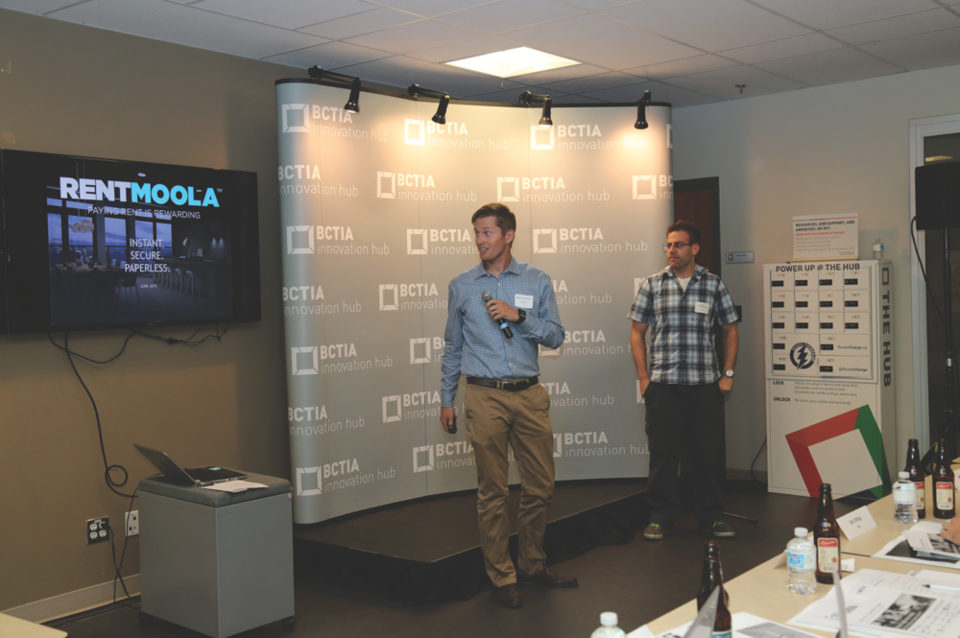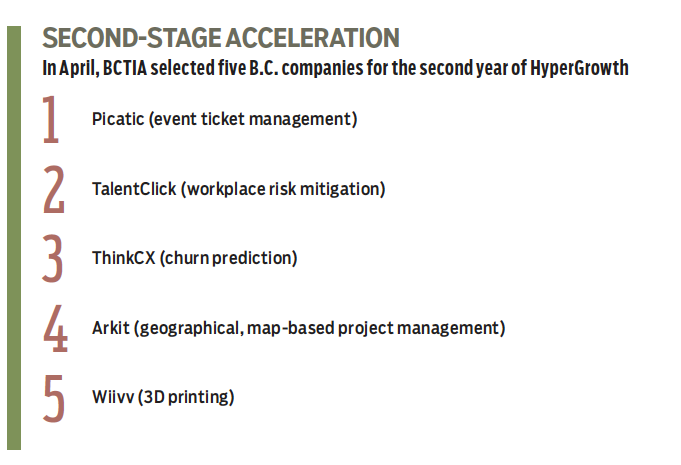When Greg Smith, CEO and founder of Thinkific, was accepted to the BC Technology Industry Association (BCTIA) HyperGrowth program in 2015, his business was already doing very well.
The three-year-old company had a strong revenue model and product-market fit, was operating globally, had paying customers and counted companies like HootSuite as clients. And it had tapped into a $45 billion self-education market growing at nine per cent annually.
Smith’s goal was simple: keep growing. After going through the application and pitch process, Thinkific was chosen, along with RentMoola and EDP Software, out of 30 applications.
Being part of HyperGrowth means having direct access to extensive training and mentoring, but it also involves a six-month serious commitment. The entire teams of the selected companies moved into the BCTIA’s 26,000-square-foot new offices in Discovery Parks on Great Northern Way for six months.
They attended workshops on marketing, sales and other business operations, met with advisers on a regular basis and put immediately into practice any new strategies they had learned around pricing, branding and digital marketing, for example.
“Given six months to participate, it meant we could implement the advice we were getting, look at results, come back and get more advice on those results,” says Smith. “We could show our mentors that we were executing on what we were talking about and then continue to get advice on the next steps.”
Within six months, Thinkific’s revenue had jumped by 300 per cent and Smith had to increase his staff from six to 16. The bonus is that he is able to keep in touch with the advisers now that he has completed the program.
“I was surprised at the mentors that they were able to get from the Vancouver community,” says Smith. “People came to give us advice from HootSuite, from BuildDirect, from Microsoft, and even large service companies like DDB marketing.”
Having these kinds of advisers participate was key to the program, says HyperGrowth program manager Clayton Weir.
“Companies like Global Relay and ACL have very substantial , locally grown technology businesses with very solid annual revenue and they’re in a position where they can pay it forward,” Weir explains. “They believe very strongly in encouraging the next generation of new technology companies.”

RentMoola’s chief strategic officer Andrew McLeod gives his pitch to the first HyperGrowth team at the BC Technology Industry Association, with (right) RentMoola CEO Philipp Postrehovsky. Accepted into Hypergrowth last year, the company now has 26 employees, a fresh $5 million in funding and is expanding its rental pay system into the United States and the United Kingdom | Submitted
That support is key to a strong tech sector in B.C., Weir says. And it comes from the executives-in-residence at BCTIA, as well as from external sources.
“Those advisers tended to gravitate to the startups from their world – offering additional advice, connections and, in some cases, investing their own money.”
As an example, Weir says, the director of marketing of ACL might go into a meeting with the HyperGrowth teams and say, “This is was we do from a best-practices perspectives for acquiring customers.”
“It’s not flashy stuff like pitch competitions but it’s the really solid backbone of company knowledge,” says Weir. “We’re trying to help them have infrastructure to keep their revenue growth on a trajectory that will pass $10 million at some point.”

The HyperGrowth program was conceived of as a key element of the BCTIA’s new facility. It launched in July 2015, just six months after the association moved into its offices. The success of the program convinced Weir and the BCTIA of the need for and benefit of second-stage acceleration.
Their goal now is to run approximately three programs every two years. Companies should cap out at about six employees. Criteria for selection includes market opportunities, meaningful differentiation within that market, the ability to execute, a positive track record and the ability of BCTIA to actually make a difference.
“There’s the question of coachability, as well,” says Weir. “Are you receptive to what we have to offer?”
Thinkific’s Smith cautions companies who may be thinking of applying for next year, and are in early-stage startup, that this program is not for those floundering or stuck in execution.
“HyperGrowth wasn’t looking for companies that didn’t know what to do next,” says Smith. “They’re looking for companies that have product-market fit, a customer base and sales and are looking to expand them. So it wasn’t us coming in saying, ‘Let’s do something radically different.’ This is what we’re doing, how do we improve it and help it grow exponentially.”
Smith was at 16 staff at the time of the interview, and still hiring.




